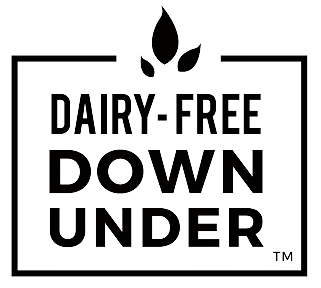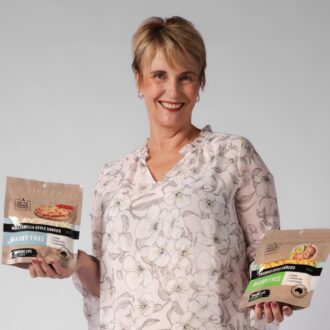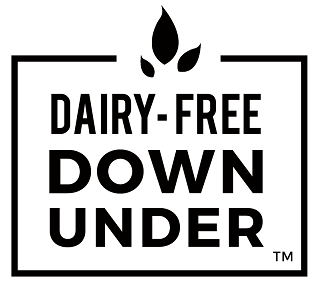Sydney-based youth worker and psychology student Julz Hunt (insta handle @julzhunt) talks with us about food inclusivity, her journey toward becoming vegan, what it means to be an empath and why she’s grateful for companies like Dairy-Free Down Under.
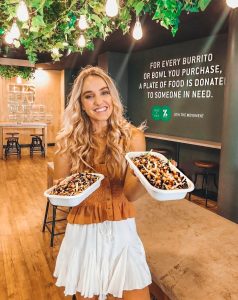 What’s your favourite Dairy Free Down Under product?
What’s your favourite Dairy Free Down Under product?
I think the Dairy-Free Down Under sour cream. I first tasted it at Zambrero. It’s got such an awesome tang to it. I hadn’t tasted sour cream in at least a couple of years, but I was like, ‘Wow. I thought it was not going to taste like that’. I was surprised to see how much it really tasted like sour cream.
Companies like Dairy-Free Down Under and Zambrero are making dairy-free options that taste like your old familiar foods, so that you can still eat pizza, nachos, and other dairy-based dishes, are these making the journey a bit easier for people like yourself?
Yes. A thousand times yes. Businesses like Dairy-Free Down Under and Zambrero, they make a huge difference in the accessibility of dairy-free products, and I think also in helping more people to make the switch to a diet that includes more plant-based meals.
Can you tell us what prompted your journey to becoming vegan?
Almost two years ago now my husband and I decided to watch the documentary Cowspiracy. After we’d finished watching it, I just remember looking over at him and seeing his face. We were so shocked and upset after learning about the meat and the dairy industry and how it affects our environment, and also entirely disregards animal welfare. Right then and there on the spot we decided to go vegan, and that same night we threw out any animal products that we had stored in the house. We’ve been vegan ever since.
Would you say that you’ve also gained some health benefits from quitting, in particular, dairy?
My hair grew really long when I turned vegan, and I felt an extra energy boost. I definitely experienced some digestion changes, my digestion is smoother now. I have also gained less food guilt as a mental health benefit. I think deep down I always knew I didn’t want to be eating dairy. I didn’t want to be eating animal products, and I always wanted to stop, but I just didn’t know how.
Now when I consume food, that guilt of contributing to the industry is gone, and I think I’m more conscious about what I’m eating and how it impacts our environment and the animals, as well as how much better it makes me feel inside and out.
What is the food that you most missed when you transitioned? It sounds like it was a very snap decision and you did extremely well to do it so quickly. Not everyone can do it like that, so what was the food that you missed the most?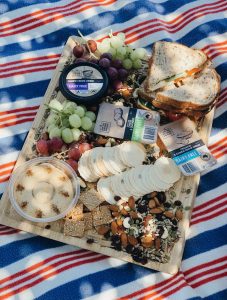
I know it was so quick. Initially I missed cheese and milk chocolate. I couldn’t find anything to replace that dairy milk chocolate taste. Since then, I’ve found epic replacements for both the chocolate and the cheese, of course with Dairy-Free Down Under options. Whenever I miss a food now, which isn’t very often because I think the alternatives are so good these days, I just shut the thought down straight away and think of my values and how it aligns. It’s been pretty easy to make a craving go away for me once I’ve connected my food back to the animal it comes from and the reality of that.
Have your food choices impacted on your relationship with others? Since going vegan, have you been ostracised in any way?
I think there have been both positives and negatives along the way. My connection to my husband is so much stronger because we’re both vegan and we have a common passion. I really admire his commitment to being a healthy vegan, and it’s helped us to live out our core values, like I said earlier. I personally believe that once we know the truth about something unjust, we have a moral responsibility to hold ourselves to do something about that. While I wish everyone held the same belief, I also think it’s an important part of being a vegan to be empathetic to people who aren’t yet ready to change their diets and who are starting small and testing out plant-based diets.
Just because I switched to vegan overnight, doesn’t mean that everyone else will or should. I don’t feel a shift of negativity towards others since turning vegan, and I admire everyone who’s doing even a small bit to change the world in this way, because I think it takes heaps of courage. I have had some people say negative things to me about being a vegan. I think it goes hand-in-hand when you’re making choices that are outside of the box in this life, or if people feel like they have to look at their own choices because of what you’re doing.
I think it’s just overall a sign that you’re reaching people. It doesn’t really offend me in any way, because I think everyone’s free to make their own decisions in this life.
How can people embrace more inclusivity when it comes to food? You’re clearly open to other people’s food choices. What are some of the tips that you can put out there? Food has become a little bit political.
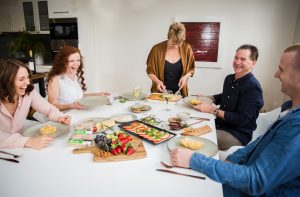 It has become a bit political, and I think that probably other people could be more inclusive by creating meals that are vegan-friendly or dairy-free at social gatherings to cater for people, and making them feel like they’re a part of that social gathering and not expected to eat something else. I think that can come from understanding the reasons why people eat the way that they do, and being curious about that why, and not just about the what. Thinking about why they’re doing that and what it means to them is a good place to start.
It has become a bit political, and I think that probably other people could be more inclusive by creating meals that are vegan-friendly or dairy-free at social gatherings to cater for people, and making them feel like they’re a part of that social gathering and not expected to eat something else. I think that can come from understanding the reasons why people eat the way that they do, and being curious about that why, and not just about the what. Thinking about why they’re doing that and what it means to them is a good place to start.
Vegans are often empathetic by nature. In your Instagram profile you’ve described yourself as an empath. Obviously you’re in youth work as well. What are the downsides to being an empath?
Look, it’s such a blessing, but it can also be an absolute curse at the same time. I think that the biggest downside would be the automatic output of energy it takes from your body to consistently be thinking about the rest of the world. Listening, understanding, and empathising with others is actually such a gift that those who aren’t as tuned in miss out on, the joy of completely understanding someone else and feeling as though you showed up and were there for them entirely.
What you have to focus on as an empath is being able to fill your own cup back up at the end of this giving to others, so to learn how to separate yourself from that situation and tune into your own feelings, to practice some self-care. Otherwise I find that you’re just living on a roller coaster that’s being driven by other people. I know a lot of empaths can lose sight of who they are in the constant giving to others. I think that it’s important to give to yourself and remember that empathy is a gift and it should be respected as such by refuelling and taking some time out.
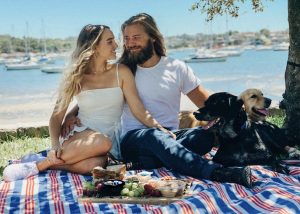 Do you think that clean eating plays a part? You and your husband based on your Instagram photos just exude health. Both of you are just gorgeous and glowy and shiny. Do you think that clean eating plays a part to filling your cup? Do you think even potentially clean eating helps you tune in more to others? How does it impact?
Do you think that clean eating plays a part? You and your husband based on your Instagram photos just exude health. Both of you are just gorgeous and glowy and shiny. Do you think that clean eating plays a part to filling your cup? Do you think even potentially clean eating helps you tune in more to others? How does it impact?
I think that clean eating helps in that I no longer feel anxious at all about what I’m consuming, and I am sure that it helps on a nutritional level as well. It definitely helps in making my idea about food less complicated and easier for me to understand what I’m eating and why I’m eating it. It has helped in that way, and it has helped to make me happy because I know that with everything that I’m doing, I’m giving back to the world.
Makes sense. You’re very open about anxiety. Do you think that anxiety is an internal thing, or do you think that the outside world plays a role? How is it for you?
The external world definitely plays a role in anxiety. I think that while heaps of aspects of anxiety do obviously occur inside your body and your mind, the triggers in the outside world are pretty major, and that can’t really be argued with. There are so many loud sounds, bright lights, and even societal pressures that are all around us these days. To get a break can be a real challenge, especially for the younger generation who are expected to be contactable 24/7.
I think the pressure to be the best in the world, especially at a younger age, can feel insurmountable. It’s absolutely understandable for me that a heap of us experience anxiety in our lives. I guess the internal biology of our fight or flight is what kicks on from those external triggers, and the way that we react to these situations, any trauma we’ve experienced, or the expectations placed on us by others are what turns that stress into anxiety.
I guess this is why I think that getting to know yourself, giving yourself that time out and even therapy is so amazing, because it can help to teach you coping mechanisms so that you can level down your anxiety and respond to the external triggers in a way that isn’t detrimental to your mental health in the future.
What did you study at uni? 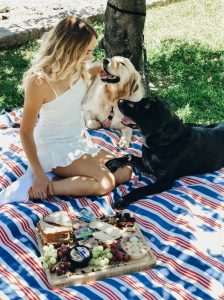
I’m studying psychology and counselling at the moment, and I work at a youth refuge where I’m using those skills every day.
Are you going to look at maybe how food impacts psychology in any of your studies?
I think I will down the road, definitely. I’m really interested in the way that nutrition impacts your nervous system, and how the combination of those two further impact your mental health and wellbeing. That really interests me.
What are some of the coping mechanisms that you have with dealing with anxiety? What are some of the ways that you fill your cup?
One of my favourite things to do is to go for a big long walk with no phone on me, just disappear and be by myself. Obviously, I make sure that I eat well and do exercise, because with anxiety, that stuff can just slip really easily, so I have to be conscious of doing that. When I’m having a difficult time, I will always talk to the people in my life who understand me and don’t judge my anxiety. I also love to journal and make sure I go to therapy regularly.
Another thing that’s been really important for me is that my world used to be really go, go, go, so fast. In the past couple of years, I’ve created a life where the majority of my downtime is really spent with an intention to bring back my energy, so that I can just keep making an impact with the work I do and not be so frazzled while I’m doing it, and, I guess, stay healthy. That just has to do with being deliberate for me, so deliberate in what I’m eating, but also how I’m treating myself and staying aware of what’s going on for me, so that I can build myself up instead of break myself down.
